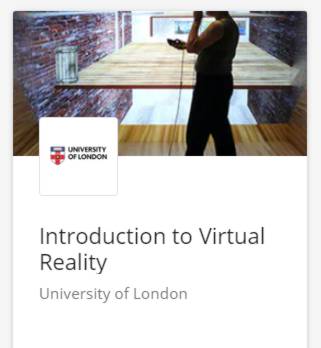| An Introduction and More to Virtual Reality On Coursera |
| Written by Sue Gee | |||
| Thursday, 16 July 2020 | |||
|
What Is Virtual Reality? How Can I Use It? These questions can be answered by following a series of five courses offered on Coursera by Goldsmiths, part of the University of London. You can dip into them for free or enroll in the Specialization and gain a valuable credential. Disclosure: When you make a purchase having followed a link to Coursera from this article, we may earn an affiliate commission. As noted only yesterday in news of an open source software toolkit to combat cybersickness many companies are experimenting with VR, not just for gaming but for more general use. For example, Unity, which is a leading proponent of VR in gaming, also has plans for VR applications for architecture, engineering and construction use. Now is obviously a good time to discover about VR and possibly embark on a new career. Coursera Specializations are fully online and students can work at their own pace and on successful completion, earn a certificate that can be shared on LinkedIn and elsewhere. The comprise a set of courses designed to allow you not only to master a specific topic, but also demonstrate your ability by completion of a final project, referred to as the Capstone, that brings the learning together. In this case, according to Cousera: By the end of the specialization you will be able to develop your very own Virtual Reality game. You will take the skills you have developed in each of the preceding courses and, using Unity, you will put these into practice to create your first virtual reality game. Along the way students will:
The first of the courses, Introduction to Virtual Reality is for those who who are new to VR as a medium and doesn't require a programming background. As part of the Specialization it can be thought of as an easy warm up. If you don't intend to go further, and don't want any certificates, then you can choose the Audit this Course option (a link in tiny print at the bottom of the 7-day Free Trial box) and follow it, and all the courses apart from the final one. free of charge. However this only gives access to the course material, you won't be able to take the quizzes, the Peer Assignments or the graded programming assignments which are really important once you get beyond the introductory level. For those who aim to complete the Virtual Reality Specialization, sign up for a 7-day free trial and then pay the monthly subscription of $49, £38 for as long as required to complete all five courses. Apart from the introductory course, the courses are at Intermediate level and have as the prerequisite "basic programming knowledge". However to get the most out of them prior experience of using Unity seems to me to be required. The five courses to be taken are:
Have a look at this video, the link to which was posted as part of a 5-star review of the course earlier this month, for an example of what can be achieved:
The final course does include more than just the project: We hope this course can be your entry into professional VR development. To help you get started, some good advice always helps. That is why we have interviewed VR experts from all over the world, ranging from technology pioneers with over 30 years experience in VR to the latest cutting edge VR creators. We have asked all of them to give you their advice and we hope it inspires you to become part of the future of VR. The course that I find most appealing is the penultimate one which includes the topic of "Social VR". The course author, Dr Sylvia Xueni Pan says of it: social is the future of VR. This course will help you become part of the future of Virtual Reality social experiences. With our recent experience of social distancing and minimizing physical contact, it seems perfectly reasonable that virtual reality social experiences are indeed going to be an important part of the future. More InformationIntroduction to Virtual Reality Virtual Reality Specialization Related ArticlesProfessional Credentials For Computer Science Careers Toolkit To Cut VR Cybersickness Released To be informed about new articles on I Programmer, sign up for our weekly newsletter, subscribe to the RSS feed and follow us on Twitter, Facebook or Linkedin.
Comments
or email your comment to: comments@i-programmer.info
|
|||
| Last Updated ( Thursday, 16 July 2020 ) |




